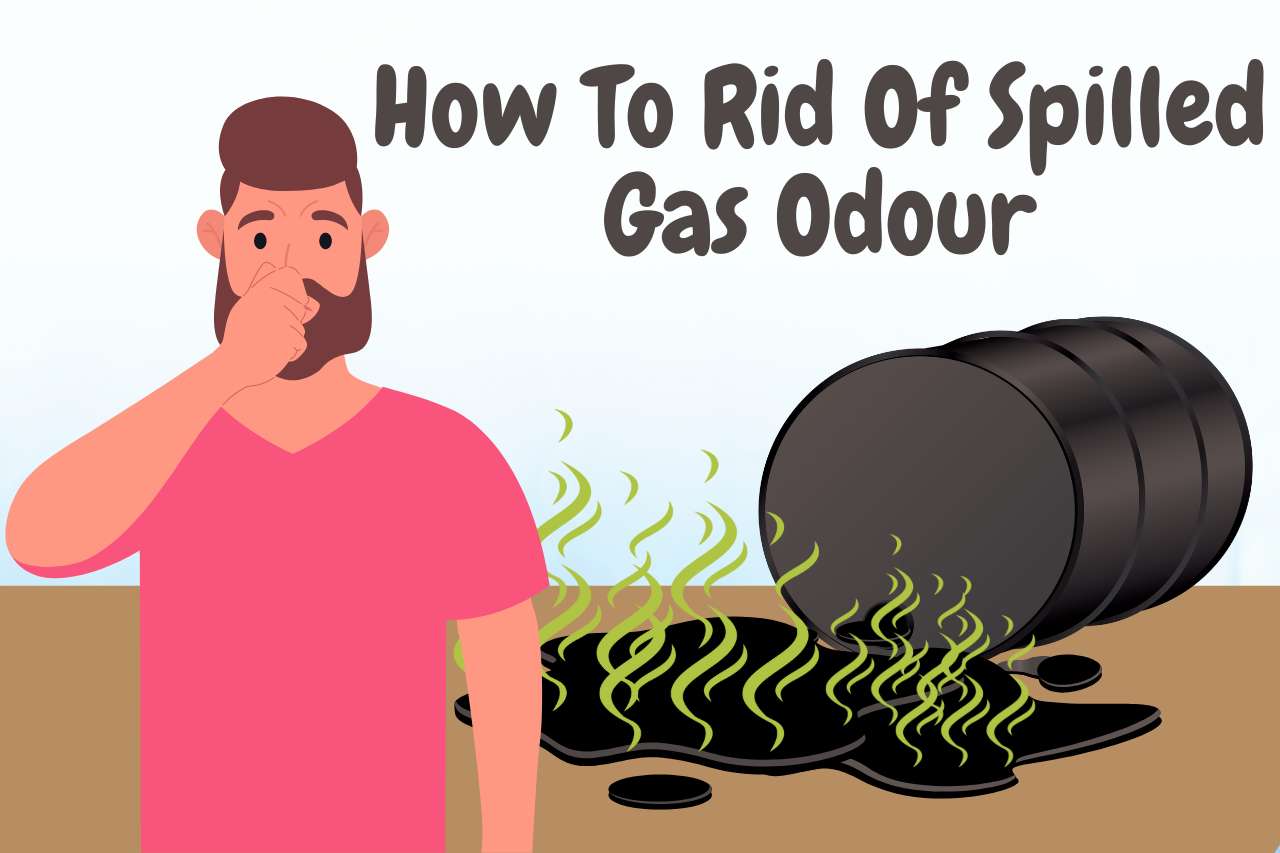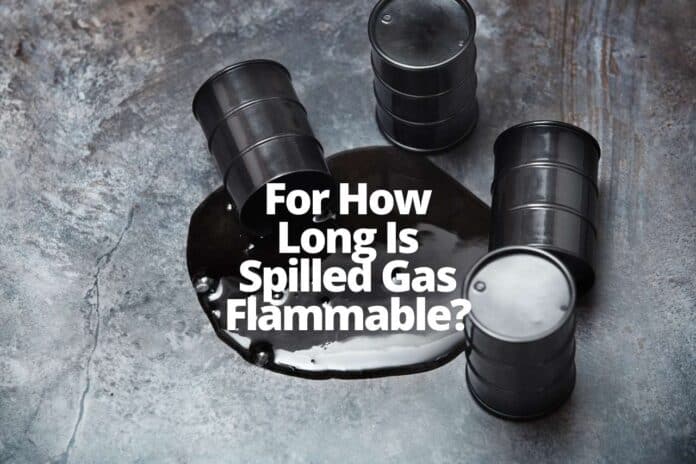Gas or gasoline is a type of primary fuel used most in vehicles. It is the primary energy source for the vehicle that produces power for the vehicle to run. The gas might spill when the gas is used to fill in bottles, gallons when refilling the gas tank or any leakages in the vehicle. Since the gas is a liquid that carries inflammable properties, there are high chances it could ignite to catch fire. Hence it is vital to know for how long is spilled gas flammable because the gas is flammable only for a specific period after it spills and subsides after some time.
How long is spilled gas flammable depends on the amount of gas spilled and the environment’s temperature. Logically, if there is a high amount of gas spilt and the weather is wet, it takes longer for the spilled gas to be flammable.
What Happens When Gas Spills?
When the gas spills over an area, it spreads a strong odour to the surrounding environment. Since the gas is flammable, if there is anything that can cause a fire, like a lit cigar, it could burn the area and spread the fire.
If you see gas spilt in an area, try to create a barrier and limit it to a space. Since the light liquid could flow, spreading to a larger area. If the gas spills on material like a carpet that percolates, place a cotton cloth or sponge to absorb and o stop seeping deep.
For How Long Is Spilled Gas Flammable?
The gas is a liquid that evaporates fast and quite more when spilt in a ventilated area. But if the gas spills in a closed space, the chances the gas can ignite to catch fire are higher, taking considerably longer to evaporate. After the gas evaporates, it leaves an oily residue in the spilt area.
Gas is also one of the most expensive types of fluid vehicles use and has a strong smell. Though it depends on the weather and the amount of gas spilt to be flammable, it generally takes approximately 15 minutes.
How Long Does It Take For The Spilled Gas To Evaporate
Many factors affect to determine how long it takes for the spilled gas to evaporate. One of the factors is the amount of gas. The lesser the amount, the less time takes, and the second factor is the environment.
The temperature of the weather and the ventilation greatly impact the time taken for the spilt gas to evaporate. As previously stated, if the gas spills over a closed area, it takes longer to evaporate than in a ventilated area.
The material the gas spills on also depends on the time taken for the evaporation. If the gas spills over a porous surface, it percolates and leaves lighter wetness, but if it spills over an impenetrable surface, it remains for a longer time.
For how long does it take for the spilt gas to evaporate? It can approximately take 90 minutes to a whole day.
How To Rid Of Spilled Gas Odour
When the gas spills over a specific area, it gives away a significant smell that is easy to recognize. The pungent smell lingers deep into the nostrils; many like the smell of gasoline, which can be addictive to sniff. But since the gas contains harsh ingredients unfavourable to the respiratory system causing breathing difficulties if inhaled for a long time.
The gas smell can last for almost a day, depending on the time taken to evaporate and the material. However, ensure the place is ventilated to eliminate the gas odour. If the doors and windows are closed, open them to the fullest. If any type of porous material is soaked, remove it from the place to get rid of the odour.
But if the case is not severe, wash the clothes after the gasoline completely evaporated. Wash it separately with detergent. If the gas spills over the seats, make a thick paste and mix appropriate amounts of vinegar, soda and hot water to clean. Let the area dry.
After following the notes above, you can use an air diffuser to give an excellent fragrance to the environment.

How To Get Rid Of Spilled Gas
Even though the gas evaporates, leaving the area dry, and you get rid of the smell, the gas will still leave an oily residue. But when you get rid of the smell of gas from the dress, it is easier to remove the gas from an area.
The methods to get rid of the gas vary from the surface it is on. If it’s on a cloth, you can get rid of it by soaking it separately in a detergent and hot water, later rinsing with water till the soapy texture leaves.
If the gas spills on a non-porous surface, avoid pouring water as gas and water mix but spread to a broader area. But you can sprinkle some washing or detergent powder over the place, leave for a few minutes, and scrub the spot. Now wash the area till the soap leaves and mop it till it dry; this way, you can get rid of the oily residue from the surface.
FAQ
Is there a difference in flammability between different types of gasoline?
Yes, there is a difference in the flammability of different types of gasoline. Due to low flash points and high vapor density, all types of gasoline are flammable. Among them, lower octane burns more quickly than higher octane.
Gasoline can be divided into three groups: Regular, Mid-range and Premium are the three types of gasoline. Regular gasoline ignites faster than the other types of gasoline, but when gasoline is in a liquid state, it will not ignite as fast as it does in gaseous state.
Of all gasoline, Chlorine trifluoride is the most explosive and can ignite without any ignition source. Luckily, it is only used to fuel rocket engines not in vehicles.
How does the temperature affect the flammability of spilled gasoline?
Gasoline has a -45 ° F flash point, meaning gasoline needs only 40°F to vaporize and catch fire. It has a 483°F ignition temperature. Flash point means the lowest temperature that needs to turn the liquid into a gaseous state and ignite if exposed to an open flame. High air temperature will increase the rate of combustion.
When the air has a high temperature, it can easily vaporize gasoline and catch fire. Gasoline vapors are dense than water vapor, so they flow invincibly on the ground and ignite from a spark, hot surface or flame.
What safety measures should be taken when handling spilled gasoline to prevent fires?
First, you must remove all the ignition sources around you. If you are in a ventilated area, immediately move as far as possible. Avoid breathing fuel fumes, and remove all your clothes if you have got contacted with fuel. Do not try to wash gasoline using water.
It will float on water and spread more easily. Instead of using water, mix water with detergent or soap. It will combine with gasoline and reduce the chance of igniting. Do not smoke near spilled gasoline. It will ignite without knowing you. Sand can also use to control spilled gasoline from flowing. It will absorb most of the gasoline, and will prevent ignition. If you are trying to handle spilled gasoline, use some explosion-proof equipment.
What factors influence the flammability of spilled gasoline?
Temperature is the most dangerous factor in the flammability of gasoline. If gasoline spreads over a place with a high temperature, it will release vapor. Wind speed is also another reason for spreading gasoline. Places with high oxygen levels in the air will also be another factor for gasoline combustion because oxygen is the primary need for combustion.
Conclusion
If the gas spills over an area, you must first take steps to minimize its effect, for example, create barriers from further spreading to a larger area or seeping into a porous surface. Ensure you don’t wash the gas into waterways, which can harm the environment.
The article contemplates how long is a spilled gas flammable. Understanding it will help you take necessary precautions for the circumstances and minimize accidents related to the fire. Because the gas evaporates fast, once the fumes start evaporating, there are fewer chances for the gas to catch fire. The article also includes the time taken for the spilt gas to evaporate and ways to eliminate the odour.
Continue Exploring: More Articles to Keep You Engaged







![What Is The Best Penetrating Oil For Seized Engine? [Explained] Best Penetrating Oil For Seized Engine](https://cargarageonline.com/wp-content/uploads/2022/07/Best-Penetrating-Oil-For-Seized-Engine-100x70.jpg)